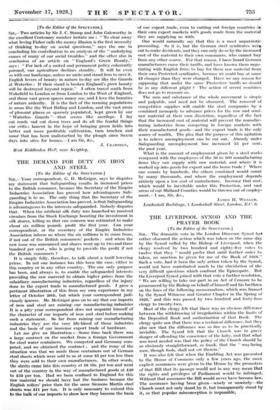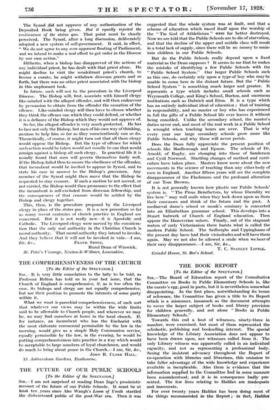THE LIVERPOOL SYNOD AND THE PRAYER BOOK [To the Editor
of the SPECTATOR.]
Sin,--The dramatic vote in the London Diocesan Synod hag rather obscured the action which was taken on the same day by the Synod called by the Bishop of Liverpool, when the clergy resolved by two hundred and eighty-five votes to twelve that they " would prefer that until further order be taken, no sanction be given for use of the Book of 1928." Such a vote, had it been the only action taken by the Synod, would not have contributed much to the elucidation of the very difficult questions which confront the Episcopate. But the Liverpool Synod joined with that vote a further resolution, " We are willing to take our part in an Act of Censure to be pronounced by the Bishop on behalf of himself and his brethren on the lines of the following memorandum, which was framed by the Synod Witnessc and Greater Chapter in the Spring of 1928," and this was passed by two hundred and forty-four clergy to twenty-two.
Most of the clergy felt that there was no obvious difference between the withdrawing of irregularities within the limits of the Deposited Book and authorization of that Book. The clergy quite saw that there was a teclurical difference, but they also saw that the difference was so fine as to be practically invisible. The Synod felt that the Church was in grave danger of offending the conscience of the laity, and that what was most needed was that the policy of the Church should be so obviously straightforward, so frank, that the " wayfaring men, though fools, shall not err therein."
It was also felt that when the Enabling Act was presented to the House of Commons only a few years ago, the most explicit assurances were given to the House by the promoters of that Bill that its passage would not in any way mean that the rights and privileges of Parliament would be infringed. Without that assurance the Bill would never have become law. The assurance having been given—wisely or unwisely—the Church must not only stand by it, but transparently stand by it, so that popular misconception is impossible.
The Synod ,did not approve of any authorization of the Deposited Book being given. But it equally rejected the continuance of the status quo. That point must be clearly perceived. The Synod, after a long discussion, deliberately adopted a new system of self-government. It said, in effect, " We do not agree to any even apparent flouting of Parliament,• and we intend to make a real effort to get order in the Diocese by our own action."
Hitherto, when a bishop has disapproved of the actions of any individual priest, he has dealt with that priest alone. He might decline to visit the recalcitrant priest's church, to license a curate, he might withdraw diocesan grants and so forth, but there was no other priest associated with the bishop in this unpleasant task.
In future, such will not be the procedure in the Liverpool Diocese. The Bishop will, first, associate with himself clergy like-minded with the alleged offender, and will then endeavour by persuasion to obtain from the offender the cessation of the offence. Like-minded clergy will then have to choose whether they think the offence one which they could defend, or whether it is a defiance of the Bishop which they would not approve of.
So far, the alleged offender is very much protected. He has to face not only the Bishop, but men of his own way of thinking, anxious to help him so far as they 'conscientiously can so do. Theoretically, of course, it might turn out that all these clergy would oppose the Bishop. But the type of offence for which such action would be taken would not usually be one that would arraign against a bishop all such clergy. In practical life it is usually found that men will govern themselves fairly well. If the Bishop failed thus to secure the obedience of the offender, that incumbent would be invited to appear in Synod, and to state his case in answer to the Bishop's gravamen. Any member of the Synod might then move that the Bishop be requested to stay censure. If such a motion be not moved, or not carried, the Bishop would then pronounce to the effect that the incumbent is self-excluded from diocesan fellowship, and the consequences of that censure would be settled by the Bishop and clergy together.
This, then, is the procedure proposed by the Liverpool clergy in place of the status quo. It is a new procedure so far as many recent centuries of church practice in England are concerned. But it is not really new—it is Apostolic and Catholic. The Liverpool clergy were moved by the considera- tion that the only real authority in the Christian Church is moral authority. That moral authority they intend to invoke. And they believe that it will not be invoked in vain.—I am, Rural Dean of Winwiek.
St. Peter's Vicarage, Newton-k-Willows, Lancashire.







































 Previous page
Previous page